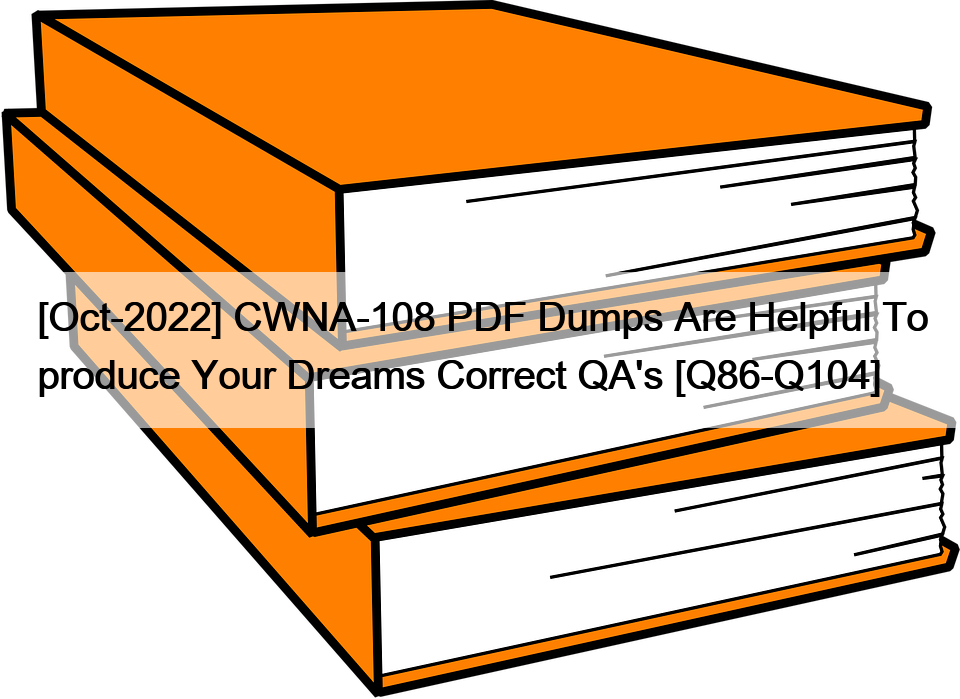[Oct-2022] CWNA-108 PDF Dumps Are Helpful To produce Your Dreams Correct QA’s [Q86-Q104]
[Oct-2022] CWNA-108 PDF Dumps Are Helpful To produce Your Dreams Correct QA’s
New CWNA-108 exam Free Sample Questions to Practice
Understanding functional and technical aspects of CWNA® – Certified Wireless Network Administrator Business Principles and Practices
The following will be discussed in CWNP CWNA-108 exam dumps:
- ERP – 802.11g
- Explain and apply the various Physical Layer (PHY) solutions of the IEEE 802.11-2016 standard as amended including supported channel widths, spatial streams, data rates
- Wireless Mesh
- Wi-Fi 6 – HE – 802.11ax
- Bandwidth
- DSSS – 802.11
- Wi-Fi 4 – HT – 802.11n
- Wireless LAN (WLAN) – BSS and ESS
- Describe the OSI model layers affected by the 802.11-2016 standard and amendments
- Wireless Ad-Hoc (IBSS)
- CWNP
- Regulatory power constraints
- Transmit Power Control (TPC)
- QPSK
- OFDM – 802.11a
- Wi-Fi Alliance
- OFDMA and Resource Units
- QAM (16, 64, 256,1024)
- Identify and apply 802.11 WLAN functional concepts
- Dynamic Frequency Selection (DFS)
- Primary channels
- Adjacent overlapping and non-overlapping channels
- Explain the roles of WLAN and networking industry organizations (CHAPTER 1)
- Understand spread spectrum technologies, Modulation and Coding Schemes (MCS)
Understanding functional and technical aspects of CWNA® – Certified Wireless Network Administrator Business Principles and Practices
The following will be discussed in CWNP CWNA-108 exam dumps:
- Describe common security options and tools used in wireless networks
- Use of management, monitoring and logging systems for troubleshooting tasks
- Understand basic concepts of WPA3 and Opportunistic Wireless Encryption (OWE) and enhancements compared to WPA2
- Identify RF disruption from 802.11 wireless devices including contention vs.
interference and causes/sources of both including co-channel contention (CCC),
overlapping channels, and 802.11 wireless device proximity - Use of wireless validation software (specifically survey software and wireless scanners)
- Use of throughput testers for validation tasks
- Use of spectrum analyzers for identifying sources of interference
- Understand basic security enhancements of encryption and integrity in WPA3 (e.g. CCMP, GCMP, AES)
- Use of wireless LAN scanners for troubleshooting tasks
- Understand interference mitigation options including removal of interference source or change of wireless channel usage
- Throughput testing
- Wireless Intrusion Prevention System (WIPS) and/or rogue AP detection
- Identify and solve RF interference using spectrum analyzers
- Access control solutions (e.g. captive portals, NAC, BYOD)
- Understand and use the basic features of validation tools (CHAPTER 12)
- Identify and troubleshoot common wireless issues (CHAPTER 13)
- Protected management frames
- Locate and identify sources of RF interference (CHAPTER 12)
- Application of AES with CCMP for encryption and integrity
- Understand basic security enhancements in WPA3 vs. WPA2
- Identify and configure effective security mechanisms for enterprise WLANs
- Fast Secure Roaming methods
- Identify sources of RF interference from non-802.11 wireless devices based on the investigation of airtime and frequency utilization
- Describe and apply common troubleshooting tools used in WLANs (CHAPTER 13)
- WPA2-Enterprise -configuring wireless networks to use 802.1X including connecting to RADIUS servers and appropriate EAP methods
- Understand the purpose of Opportunistic Wireless Encryption (OWE) for public and guest networks
- Identify causes of insufficient throughput in the wireless distribution systems including LAN port speed/duplex misconfigurations, insufficient PoE budget, and insufficient Internet or WAN bandwidth
- Best practices in secure management protocols (e.g. encrypted management HTTPS, SNMPv3, SSH2, VPN and password management)
- Simultaneous Authentication of Equals (SAE) in WPA3 as an enhancement for legacy pre-shared key technology
- Protocol and spectrum analyzers
- VoIP testing
- Real-time application testing
- Use of spectrum analyzers for validation tasks
- Use of protocol analyzers for troubleshooting tasks
- Network and service availability
- Verify and document that design requirements are met including coverage, throughput, roaming, and connectivity with a post-implementation validation survey (CHAPTER 12)
- Perform application testing to validate WLAN performance (CHAPTER 12)
- WPA2-Personal including limitations and best practices for pre-shared (PSK) use
The CWNP CWNA-108 test is the basis of enterprise networking skills within the entire certification plan for CWNP. It provides the foundation needed to earn the other certificates specializing in analysis, design, and network expertise. In its complete form, the CWNA means Certified Wireless Network Administrator.
Cover CWNA-108 Exam Questions Make Sure You 100% Pass: https://www.examslabs.com/CWNP/CWNA-Certification/best-CWNA-108-exam-dumps.html







Leave a Reply